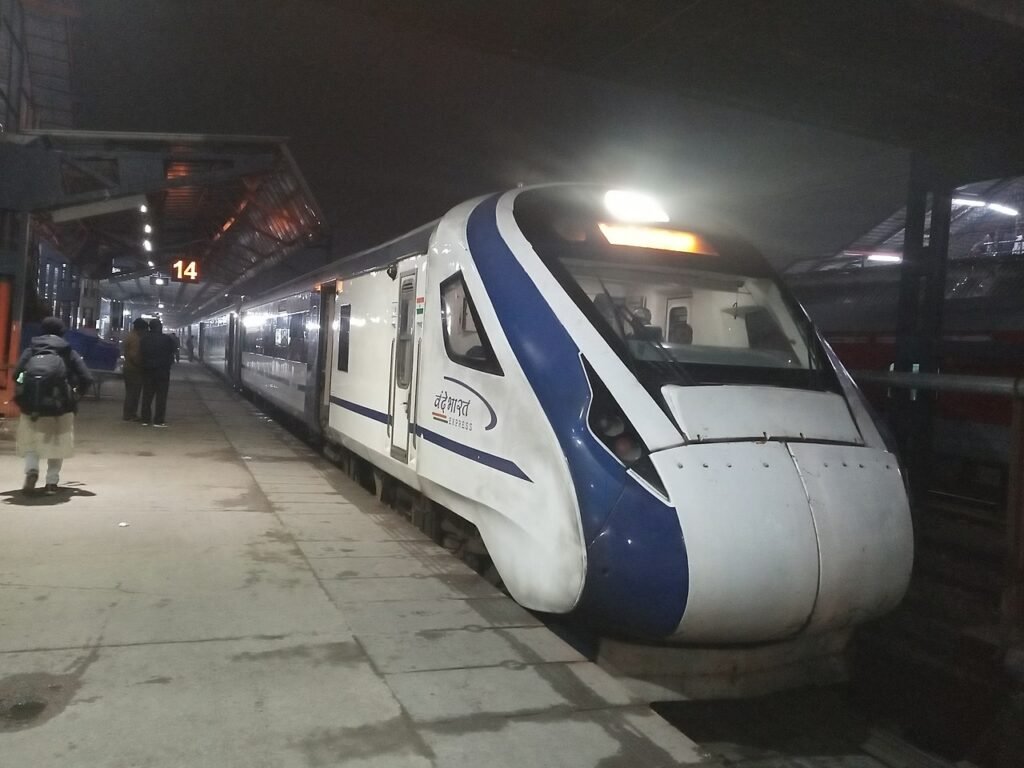Read in : தமிழ்
Finance Minister Nirmala Sitharaman’s budget announcement of rolling out 400 Vande Bharat Express trains in three years has created a buzz in railway circles. As of now, the country has just two Vande Bharat express trains, with the Prime Minister having set a target of operating 75 of them by August 2023 to mark 75 years of Indian Independence.
The Vande Bharat Express, called Train 18 in railway circles, is a self-propelled train. Indian Railways’ Integral Coach Factory (ICF) in Chennai designed and executed the project. The two prototypes designed by ICF are running in the Delhi-Varanasi and Delhi-Vaishno Devi Katra routes.
In January 2021, the railways finalised the tender for the supply of 44 new Vande Bharat trains for ₹2,211.65 crores. It was decided at the time that 44 trains are to be manufactured in the first phase, out of which ICF Chennai will manufacture 24, and 10 each will be be made at Rail Coach Factory, Kapurthala and Modern Coach Factory at Raebareli. Interestingly, only ICF has the expertise of making them. “It is not a big deal. The other two will learn quickly,” said an ICF official.
Indian Railways operate 13,000 trains per day. Replacing 400 of them with Vande Bharat Express trains translates to replacing 3 % of the existing fleet.
But ICF is still awaiting approval for the third prototype of the train. Railways’ Research Design & Standards Organization (RDSO) has to approve it. The Commissioner of Railway Safety also has to approve the design. ICF officials are optimistic that the production can scale up quickly once the prototype is approved.
The pandemic, however, put a spoke in the wheel of production. It has brought down the production capacities of all coach making units in the country. Every coach making factory depends on suppliers for every component in the assembly line, just like a car manufacturing unit. As the suppliers are facing an economic crunch, the coach making units are operating at half of their actual capacity. For instance, ICF can make 4,000 coaches per annum, but it is making only 2,500 as of now, say officials.
Each Vande Bharat Express contains 16 coaches with self-propelled locomotives at the front and rear. Hyderabad-based Medha Servo Drives Pvt. Ltd was awarded the tender to supply propulsion and control equipment for these trains. The power is evenly distributed through the motor cars in alternative coaches. Operated with HOG (head on generation) equipment, this self-propelled train is driven by 25KV 50 Hz traction motors. They also come with regenerative braking. It means when the train brakes, it generates power that can be used by the train.
The train’s features include automatic doors, smoke alarms, CCTV cameras, bio-vacuum toilets, sensor-based water taps, foot rests, head rests, seat pockets and bottle holders. The seating arrangement is like rotatable airline style seats. On board wifi and electric charging outlets are available to passengers.
400 Vande Bharat trains means 6,400 coaches have to be ready in three years. The pandemic, however, has brought down coach production. As the suppliers of components are facing an economic crunch, the coach making units are operating at half of their actual capacity. For instance, ICF can make 4,000 coaches per annum, but it is making only 2,500 as of now, say ICF officials.
The Vande Bharat Express is intended to replace the premium Shatabdi Trains operated as Chair Cars between important cities. In the future, sleeper coaches could replace the chair cars as well. “It is like advanced MEMU (Mainline Electric Multiple Unit) with more comfort and safety features. The travel is smooth and noiseless,” says techie and a rail fan Arun who has traveled in Vande Bharat Express trains.
Indian Railways operate 13,000 trains per day. Replacing 400 of them with Vande Bharat Express trains translates to replacing 3 % of the existing fleet. The railways may need 400 rakes on the tracks. Each rake will consist of 16 coaches. On a rough estimate 6,400 coaches have to be ready in three years. For operational purposes, railways may also need spare rakes once all these 400 rakes are put in use.
Though it is a tight target, an ICF official believes that it is still achievable in three years. “Once the teething problems are resolved, all three coach making factories in India can manufacture the required rakes for the 400 trains,” the official said.
Vande Bharat Express is a high-speed train, designed to run at 200kmph. But the speed is limited to 130 kmph because our tracks are not suitable for a high-speed rail system. During trials, the Vande Bharat train was able to achieve speeds of up to 180 kmph. “The budget announcement of 400 trains sounds attractive. But where are the tracks?” asks P Edward Jeni, Secretary of Kanyakumari District Rail Users Association.
The association has demanded that railway authorities ply a Vande Bharat Express between Chennai and Kanyakumari. “There are three routes namely Chennai-Kanyakumari, Chennai-Coimbatore and Chennai-Bengaluru where these trains can be operated in Tamil Nadu. So, we have appealed to the railway authorities to operate one from Chennai to Kanyakumari which will benefit the entire state in true sense,” says Jeni.
Read in : தமிழ்
